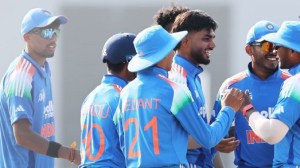Explained: Assam’s decision to withdraw Foreigner Tribunals cases against Koch Rajbongshis, why it matters
Who are the Koch Rajbongshis, and why are they caught in Assam’s citizenship tangles? What is the decision's political significance now? We explain.
 Foreigner Tribunals are tasked with adjudicating whether “suspected foreigners” (D-voters and cases referred to them by the border police) are foreigners, that is, people who entered India after March 25, 1971, according to the 1985 Assam Accord. (Express archives)
Foreigner Tribunals are tasked with adjudicating whether “suspected foreigners” (D-voters and cases referred to them by the border police) are foreigners, that is, people who entered India after March 25, 1971, according to the 1985 Assam Accord. (Express archives)Earlier this month, the Assam Cabinet announced the withdrawal of around 28,000 pending cases at the state’s Foreigner Tribunals against members of the Koch Rajbongshi community. The quasi-judicial bodies are meant to “furnish opinion on the question as to whether a person is or is not a foreigner within the meaning of Foreigners Act, 1946”.
Chief Minister Himanta Biswa Sarma said the decision was taken as the state government considered them an “indigenous community”. Where is the community located in the state’s socio-political tapestry, and why is the move significant? We explain.
Who are the Koch Rajbongshi?
The community traces its lineage to the Koch Dynasty of the Kamata Kingdom, which rose to power in the 16th century. Today, its members are spread across Assam and West Bengal, as well as parts of Bihar, Meghalaya, Bangladesh, Nepal and Bhutan, reflecting the geographical spread of the kingdom.
In Assam, the community has a significant presence in the western districts of Goalpara, Dhubri, South Salmara Mankachar, Bongaigaon and Kokrajhar. In 2020, given their dominant presence in some regions, the state government created a Kamatapur Autonomous Council in parts of these districts for the “social, economic, educational, ethnic and cultural advancement of the Koch Rajbongshi community.”
While the community has OBC status in Assam, it is one of six communities that has long been demanding Scheduled Tribe status – a politically fraught issue in the state. Another demand that gathered steam in the 1990s, though stronger among West Bengal-based groups, has been for a separate Kamatapur state comprising parts of northern West Bengal and western Assam.
Why have there been citizenship cases against them in Assam?
According to Khitish Koch, president of the All Koch Rajbongshi Students Union, the transborder nature of the community has played a role in the “D-voter” (Doubtful voter) tag being attached to many Koch Rajbongshis, putting a question mark on their citizenship. Foreigner Tribunals are tasked with adjudicating whether “suspected foreigners” (D-voters and cases referred to them by the border police) are foreigners, that is, people who entered India after March 25, 1971, according to the 1985 Assam Accord.
“The former kingdom included parts of present-day Bangladesh as well, which was first partitioned into East Pakistan in 1947 and then in 1971… The community was divided in this way, but before that, many people had come to Assam. After Bangladesh was formed, many people have been harassed with these cases,” he said.
Author Arup Jyoti Das, who wrote the book Kamatapur and the Koch Rajbanshi Imagination, said that like many other transborder communities, there are families who have relatives on either side of the border. “The Rangpur area in present-day Bangladesh was also part of the Kamata kingdom, and there are many people who migrated over the time, both before and after the Partition and in the 1960s,” he said.
However, Das said some in the community have questioned the 28,000 figure cited by the chief minister. “This is a little ambiguous because there are many surnames, such as my own, Barman, Sarkar, which are used in different communities, so there are questions about whether more people are being clubbed together and being benefitted ahead of next year’s election.”
What is the political significance of this announcement?
The six communities have long been promised the fulfillment of their ST status demand. Prime Minister Narendra Modi lent his support to it while campaigning in Assam for the 2014 Lok Sabha elections.
Eleven years later, a Group of Ministers formed by the state government to examine the demand has yet to formalise its report on the quantum of reservation and measures to safeguard the rights and interests of existing tribal communities. According to the 2011 census, 12.4% of the state’s population comprises Scheduled Tribes.
As the 2026 Assam Legislative Assembly election draws closer, the groups are expected to build pressure on the state government. “We are thankful for [the government] withdrawing cases because people have been harassed for years. But we have been demanding constitutional protections, and this is our central demand for our foundational rights. We last had a meeting with the Chief Minister on this issue on February 5. If this is not fulfilled soon, we will not accept any promises from the state or centre,” said Koch.
Have similar concessions been made for other communities?
In 2021, the Assam Cabinet had similarly announced the withdrawal of cases against members of the Gorkha community. In July last year, the Assam government instructed the state’s border police not to directly refer citizenship cases of “Hindu, Sikh, Buddhist, Jain, Parsi or Christian” people, who entered India before the end of 2014 to Foreigners Tribunals and instead encourage them to apply for citizenship under the Citizenship (Amendment) Act (CAA).
However, these actions have led to questions of why a similar withdrawal has not been extended to the state’s Muslim sub-groups, identified as “indigenous” by the Assam government. In 2022, the Assam cabinet approved the identification of five sub-groups – Goriya, Moriya, Julha, Deshi and Syed – as “indigenous” Assamese Muslim communities, effectively setting them apart from Bengali-speaking Muslims.
“We have been demanding that these cases should be withdrawn for around the last 10 years. The most affected are Deshi people, who are converted Koch Rajbongshis, who live mostly in Goalpara and Dhubri and speak the Goalparia dialect,” said Nurul Haque, president of the Sadou Asom Goria-Moria-Deshi Jatiya Parishad.
According to a 2021 report on the ‘Cultural Identity of Indigenous Assamese Muslims’ by a government-constituted sub-committee, “Deshis are believed to be among the first batch of people in Assam to have embraced Islam. They trace their lineage to Ali Mech, the Koch-Rajbongshi chieftain who converted to Islam during the invasion of Bakhtiyar Khilji.”
Masud Zaman, an advocate working on citizenship cases in Dhubri, a border district with among the highest number of such cases, said that Deshis and Bengali-origin Muslims there have been affected by citizenship processes at a similar scale.
“Their names are similar to those called Miyas (a pejorative term used for Bengali-origin Muslims), there is only a slight difference in dialect and there are inter-marriages. Even now, cases are being made against Deshis even after the government said they are “indigenous”. My client Alima Begum, a Deshi, was declared Indian by an FT in 2007 but three months ago, another case was brought against her by the border police… “Indigenous” is a vague word which does not feature in Indian law, and it is being applied where and when it suits the government politically,” he said.
- 01
- 02
- 03
- 04
- 05






































